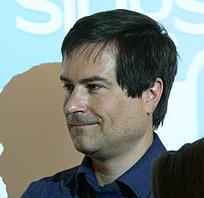In May 2011, Braben announced a new prototype computer intended to stimulate the teaching of basic computer science in schools. Called Raspberry Pi, the computer is mounted in a package the size of a credit card, has a USB port on one end with a HDMI monitor socket on the other, and provides an ARM processor running Linux for an estimated price of about £15 for a configured system, cheap enough to give to a child to do whatever he or she wants with it. [8] The Raspberry Pi Foundation is a charity whose aim is to "promote the study of computer science and related topics, especially at school level, and to put the fun back into learning computing". [9]
Game development
Braben has been called "one of the most influential computer game programmers of all time", based on his early game development with the Elite series in the 1980s and 1990s. [10] Next Generation listed him in their "75 Most Important People in the Games Industry of 1995", chiefly due to the original Elite . [11]
Elite was developed in conjunction with programmer Ian Bell while both were undergraduate students at Cambridge University. Elite was first released in September 1984 and is known as the first game to have 3D hidden-line removal. In 1987, Braben published Zarch for the Acorn Archimedes, ported in 1988 as Virus for the Atari ST, Amiga, and IBM PC compatibles. [12]
After Zarch, Braben went on to develop the sequel to Elite, Frontier , published in 1993, and founded Frontier Developments, a games development company whose first project was a version of Frontier for the Amiga CD32. Braben is still the President and majority shareholder of the company, whose projects since 2000 have included Dog's Life , Kinectimals , RollerCoaster Tycoon 3 , LostWinds , Planet Coaster , Elite: Dangerous , Jurassic World Evolution , Kinect Disneyland Adventures , Zoo Tycoon , Coaster Crazy, and games based on the Wallace & Gromit franchise. [13]
In 2006, Braben was working on an ambitious next-generation game called The Outsider , being developed by Frontier Developments. As said in an interview, [14] he was planning to start working on Elite 4 – as a space MMORPG game – as soon as The Outsider went gold. Braben said explicitly that this title was of special value to him. The Outsider was abandoned due to the removal of publisher support and was never published.
In 2012, Braben explained in an interview with developer website Gamasutra his opinion that the sale of secondhand games negatively affects the development of new titles, also holding the price of games in general much higher than they would otherwise be. [15] However, later in 2014 he acknowledged: "Piracy goes hand in hand with sales. If a game is pirated a lot, it will be bought a lot. People want a connected experience, so with pirated games we still have a route in to get them to upgrade to the real version. And even if someone's version is pirated, they might evangelise and their mates will buy the real thing." [16]
On 6 November 2012, Braben's Frontier Developments announced a new Elite sequel called Elite: Dangerous on the Kickstarter crowdfunding site. [17] Elite: Dangerous achieved its funding goal and was listed as one of the most funded Kickstarter campaigns. [18] The game was released on 16 December 2014, and by April 2015 had sold over 500,000 copies. [19] As of August 2017, the game has sold over 2.75 million copies. [20] [21]
In August 2022, Frontier announced David’s transition to his new role of President and Founder, stepping down as CEO.

